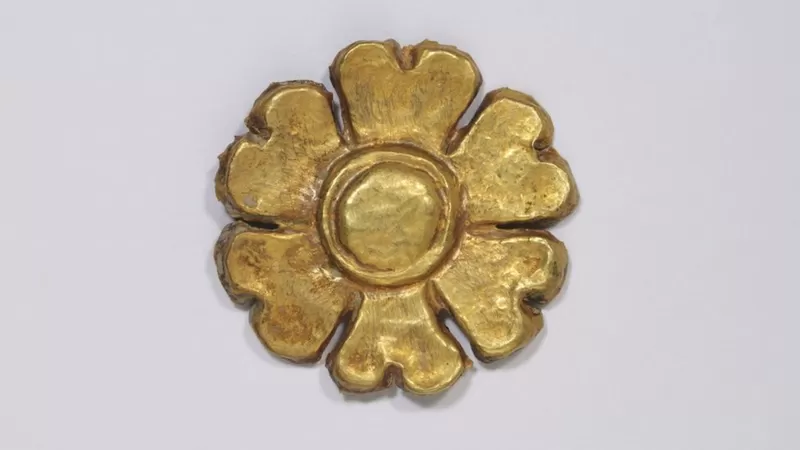A vast trove of Cambodia’s Angkorian crown jewellery, some dating back to the 7th Century, resurfaced in London last summer, it has been revealed.
The stolen items belonged to British antiquities smuggler Douglas Latchford.
Experts say they have never seen most of the jewellery before and are stunned by its existence.
The collection has been secretly returned to Cambodia’s capital, Phnom Penh, and is due to go on display there in the country’s national museum.
Latchford died in 2020 while awaiting trial in the US. His family promised to return his stolen collection to Cambodia after he died, but the authorities did not know what exactly would be handed over or how it would happen
Brad Gordon, the head of Cambodia’s investigative team, became the first representative of the nation to see the jewellery when he visited London last summer. He told the BBC: “I was driven by a representative of the Latchford family to an undisclosed location. In the parking lot was a vehicle with four boxes inside.
“I felt like crying. I just thought – wow – the crown jewels of ancient Cambodian civilization packed into four boxes in the back of a car.”
When it was all unwrapped, the resurfaced collection was found to contain 77 pieces of gold and jewel-encrusted jewellery, including crowns, belts and earrings. A large bowl is thought to date to the 11th Century and although it has yet to be tested, appears to be made of solid gold. Experts believe it could have been used as a rice bowl for Angkorian royalty.
One of the crowns appears to be from the pre-Angkorian period, experts believe, and could have been made by artisans in the 7th Century. Other items, including a small sculpted flower, pose a mystery. Experts simply don’t know why it was made or how it was used.
It’s still unclear exactly how and when the jewellery was stolen and how it made its way to London. Many of the items can be matched to stone carvings in the walls of Angkor Wat, a Unesco World Heritage Site. The largest religious monument in the world, its construction began in 1122 as a dedication to the Hindu God Vishnu, though it transitioned into a Buddhist temple decades later.
Angkor Wat was heavily looted during the French colonial period. However, many of Cambodia’s other temples were looted during the Khmer Rouge era in the 1970s, and the turmoil that continued for decades.
Archaeologist Sonetra Seng studied Angkorian jewellery for years by examining temple carvings. Finally, she can hold the real thing.
“The jewellery proves what was on the carvings and what was rumoured is really true. Cambodia was really, really rich in the past,” she says. “Still, I can’t believe it, especially that it’s from one single collection found abroad.”
Some of the jewellery had surfaced before; Douglas Latchford included five items from the collection in a book titled Khmer Gold that he co-wrote with his collaborator, Emma Bunker, in 2008. Khmer antiquities expert Ashley Thompson describes this book and two others as elaborate sales brochures, giving private collectors a taste of what was being sold illegally behind the scenes.
“Publishing these materials, inviting other scholars to contribute and comparing the items to museum pieces was a way of validating them and associating them with known materials already in museums and effectively enhancing their value,” she explained.
Ms Thompson, a professor in South East Asian art at SOAS University of London, says it will take a long time for experts to piece together where the newly discovered jewellery really came from because the book contains so many half-truths.
“You certainly can’t take for granted anything that is said about the provenance or the current ownership,” she explained, as she flipped through the book and pointing to the way in which Latchford and Bunker described the ownership of the different pieces of jewellery. “Private Thai collection, private London collection, private New York collection, private Japanese collection etc. You have to be very wary.”
The Cambodian authorities believe that more Angkorian jewellery is yet to be found. The Cambodians have evidence from Latchford’s email correspondence that he was attempting to secretly sell the collection from a north London warehouse as late as 2019.
We asked London’s Metropolitan Police if Latchford’s UK associates are also being investigated. They declined to comment – noting they do not identify anyone under investigation prior to being charged with a criminal offence.
Last year, the BBC travelled to Cambodia to meet looters turned government witnesses who identified items they say they stole from temples and sold to Latchford. Some of those items have been matched by investigators to museum pieces that are now in respected UK institutions like the British Museum and the V&A.
One of the women the BBC interviewed then – nicknamed Iron Princess – will also work to help identify some of the jewellery.
For now, the collection’s return will be welcomed by the country’s autocratic leader, Hun Sen. An election is coming up in July, and since his ruling party has effectively dismantled the opposition, this development will be painted as something Hun Sen has done to benefit his people.
Politics aside, ordinary Cambodians want all the looted items back. After decades hidden inside dusty boxes, it will soon go on public display in Phnom Penh, allowing this jewellery to shine once again.








